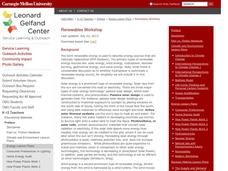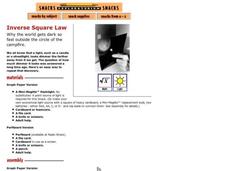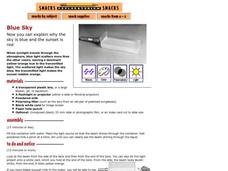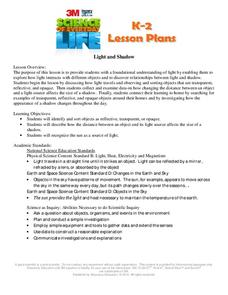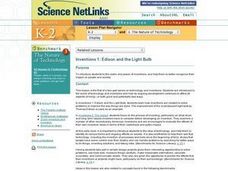Teach Engineering
Light vs. Heat Bulbs
Careful, that light bulb is hot! Compare heat and light energy using a simple light bulb. The exercise addresses energy conservation and presents actual calculations to determine the most cost-effective light bulb.
Teach Engineering
Light Intensity Lab
Let there be light. The last installment of a seven-part series has pupils conduct an experiment on light attenuation through different numbers of transparency sheets. They then relate the results back to how X-rays measure bone density.
Carnegie Mellon University
Renewables Workshop
Youngsters examine resource maps to find out which states are using solar and wind power and discuss as a class various other renewable energy sources. They use a provided data table to record pros and cons to each technology, build and...
Scholastic
Study Jams! Renewable Fuels
A single slide introduces each of the following renewable energy sources: hydroelectric, wind, geothermal, solar, tidal, and biomass. This provides a succinct overview that you can use as a visual aid when you first introduce alternative...
Carnegie Mellon University
Transportation
Teach your environmental studies, life science, or engineering class how an internal combustion engine works using the first few slides of the accompanying presentation. Then, focus in on the resulting carbon emissions. Finally, take a...
Texas State Energy Conservation Office
Investigation: Waves and Whistles
Wave goodbye to the same old demonstrations for alternative energy sources, and wave hello to this one investigating ocean waves! Using a water bottle to create an oscillating water column, learners see and possibly hear how the...
Exploratorium
Inverse Square Law
The inverse square law is revealed when your class participates in this activity. They move a graph paper or perfboard square back and forth in a square of light to see how the intensity changes. You will definitely want to add this...
Exploratorium
Diffraction
Kindle knowledge of how light travels by using this activity in your physical science curriculum. By setting up a candle flame or flashlight bulb and viewing it through a slit, observers of light see evidence of its wave characteristic....
Exploratorium
Blue Sky
Use a container full of water as a prism and show that as light is bent, the individual colors from different wavelengths become visible. This explains why the sky appears to be blue midday, and why as the sun nears the horizon, it looks...
Curated OER
Light and shadow
Learners experiment with light and shadow. In this light lesson, students look at the relationship between shadows and light. They experiment with light source, shadow size, transparent objects and reflective objects.
Curated OER
Light and Vision
Students explore how light affects vision. In this light lesson, students construct a shoe box model to represent an eye. Experiments are performed with various light sources. Students draw conclusions about how the eye works as they...
Curated OER
Vision and Optics: Light and Lenses
Students gain a conceptual comprehension of the functioning of the Human Eye in relation to optics and optical vision correction. They explore optics with light sources and various lenses, relating these to visual acuity, accommodation,...
BBC
Light and Dark
Learners investigate different sources of light. In this light instructional activity, students determine that light occurs naturally as well as with technology created by mankind. Learners work together to identify sources of light....
Curated OER
Light 2: The Lighter Side of Color
Young scholars explore light and color, including how colors are mixed to produce new colors, how light is filtered, and how light is reflected off of surfaces.
Curated OER
Bubble-ology
Students observe the visible spectrum while observing light hitting the surface of bubbles. They blow large bubbles and observe how the colors change.
Curated OER
Inventions 1: Edison And The Light Bulb
Students examine the realm and power of inventions, and recognize their impact on people and society. Small groups pretend to have been hired by Edison to make special posters that advertise the uses and benefits of the light bulb.
Curated OER
Series or Parallel?
Emerging electricians extend mental models of light bulbs and resistors in series and or in parallel circuits to include the connection of photovoltaic cells in arrays. They investigate open circuits, using a DC voltmeter, a light...
University of Colorado
Can Photosynthesis Occur at Saturn?
In the 19th activity of 22, learners determine if distance from a light source affects photosynthesis. Participants capture oxygen in straws and find that the amount of water the gas displaces is proportional to the rate of photosynthesis.
Kenan Fellows
Electricity: Sources, Usage, Challenges, and the Future
What does the future of energy look like? Junior engineers collaborate to discover a solution to the global energy crisis during a very hands-on lesson. The unit focuses on learning through collaboration to develop a deep understanding...
Cold Spring Harbor Laboratory
Mutations Are Changes in Genetic Information
A red delicious apple tree with a simple mutation means we now benefit from the existence of golden delicious apples. Learn how simple mutations change genetic information in DNA sequences. Using biographies, videos, and animations,...
Columbus City Schools
It’s Electric!
Shocking! Who knew so many great ideas existed for teaching middle schoolers about electricity? Find them all within this energetic framework. You'll light up at the variety of printable and web-based resources within! After building...
Curated OER
Earth's Radiation Budget
Twelfth graders explore the Earth's radiation budget using Earth radiation Budget Experiment (ERBE) data archived at the IRI/LDEO Climate Data Library. They use photometers and light sources to work through several hands-on activities...
Curated OER
The Light for Sight
In this eye and light worksheet, students make models of the eye using black and white cardboard, a light source, and a bowl of water. They explain how each part of the model corresponds to a part of the eye. Students answer 4 discussion...
Exploratorium
Oil Spot Photometer
Are these two light sources the same? Groups use a white card and a little cooking oil to create a photometer that allows for the comparison of two lights. The Inverse Square Law provides a way to calculate the actual difference in...




